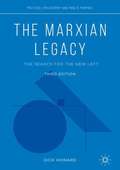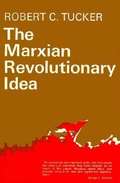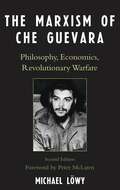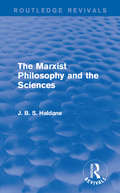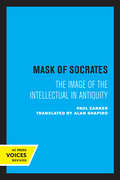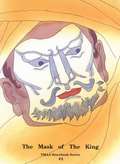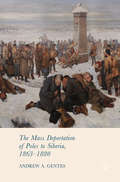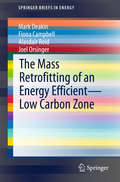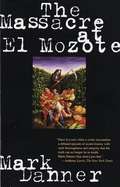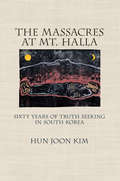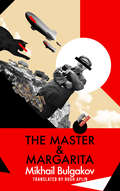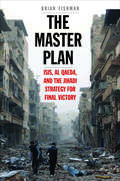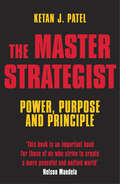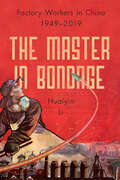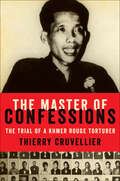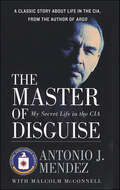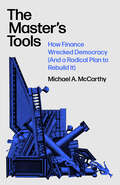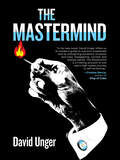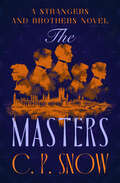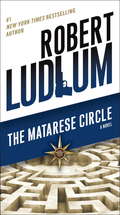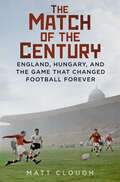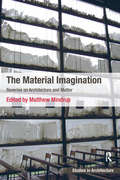- Table View
- List View
The Marxian Legacy: The Search for the New Left (Political Philosophy and Public Purpose)
by Dick HowardThe Marxian Legacy, first published in 1977 and released in a second edition in 1988, was and remains distinct in its view of Marxian theory as 'critique, ' aware of its own origins and limitations and self-conscious about its own historical rootedness in changing social and political conditions. This new and fully revised third edition retains the original synthesis of the divergent traditions of German, critical, and French Marxisms into a living Marxian legacy that changes and reconceptualizes itself, while also providing a new critical introduction and concluding chapter. Such a re-evaluation of the Marxian legacy, which was urgent in the 1970s when the United States was caught up in imperial wars and domestic as well as racial conflict, remains relevant today when—as was the case nearly half a century ago—Marx’s legacy has largely been forgotten and yet remains as a symbol of radical thinking that could inspire the new movements. The Marxian Legacy, 3rd Edition retains the freshness of discovery from those times while fully updating the text for our contemporary moment, and adding two features: a philosophical closure; and, a perspective on what was possible then, and what remains to be done today.
The Marxian Revolutionary Idea
by Robert C. Tucker"In his parting word about Marx at Highgate Cemetery, Engels characterized his friend as 'before all else a revolutionist.' This was a true summation of Marx both as a man of action and as a thinker. For as a theorist Marx was before all else a theorist of revolution. The revolutionary idea was the keystone of his theoretical structure. Marxism, as he fashioned it with the assistance of Engels, was in its essence a theory and program of revolution." In this volume Robert C. Tucker looks critically at the later writings of Marx and Engels, not only as political theory but as the ideology for political revolution. From the vantage point established in his earlier work that there is a continuity underlying Marx's writing from the newly discovered manuscripts of 1844 to the mature work, Capital--Professor Tucker examines Marx as a social, moral, and political theorist, and a theorist of modernization. "The Marxian Revolutionary Idea" is followed, in thought and application, through infancy to maturity, in success and failure, and finally as it has been transformed by modern socialism.
The Marxism of Che Guevara: Philosophy, Economics, Revolutionary Warfare
by Michael Löwy&“Excellent. . . .The book gives one a clear understanding of the relationship of Guevara's thought to traditional Russian and Marxist philosophy.&” —Choice Reviews In this seminal exploration of Che Guevara&’s contributions to Marxist thinking, Michael Löwy traces Che's ideas about Marxism both as they related to Latin America and to more general philosophical, political, and economic issues. Now revised and updated, this edition includes a chapter on Guevara's search for a new paradigm of socialism and a substantive essay by Peter McLaren on Che&’s continued relevance today. Löwy portrays Guevara as a revolutionary humanist who considered all political questions from an internationalist viewpoint. For him, revolutionary movements in Latin America were part of a world process of emancipation. Löwy considers especially Che's views on the contradiction between socialist planning and the law of value in the Cuban economy and his search for an alternative road to the &“actually existing socialism&” of the Stalinist and post-Stalinist Soviet bloc. Che&’s varied occupations—doctor and economist, revolutionary and banker, agitator and ambassador, industrial organizer and guerrilla fighter—were expressions of a deep commitment to social change. This book eloquently captures his views on humanity, his contributions to the theory of revolutionary warfare, and his ideas about society&’s transition to socialism, offering a cohesive, nuanced introduction to the range of Guevara's thought. &“An excellent classroom tool for anyone teaching about Latin America or revolution.&” ―Science & Society &“[This book] provides us with the picture of [Guevara&’s] great, flexible, and searching mind.&” —Carleton Beals &“Michael Löwy&’s brief but penetrating book takes Che Guevara not as a romantic adventurer but as a serious revolutionary militant.&” ―Telos
The Marxist Philosophy and the Sciences (Routledge Revivals)
by J. B. HaldaneThis book, first published in 1938, is based upon the Muirhead lectures on political philosophy delivered in the University of Birmingham in January and February of 1938. This title was intended to be of interest to students and scientific workers in the belief that Marxism will prove valuable to them in their scientific work, as well as to a wider audience.
The Mask of Socrates: The Image of the Intellectual in Antiquity (Sather Classical Lectures #59)
by Paul ZankerThis richly illustrated work provides a new and deeper perspective on the interaction of visual representation and classical culture from the fifth century B.C. to the fourth century A.D. Drawing on a variety of source materials, including Greco-Roman literature, historiography, and philosophy, coupled with artistic renderings, Paul Zanker forges the first comprehensive history of the visual representation of Greek and Roman intellectuals. He takes the reader from the earliest visual images of Socrates and Plato to the figures of Christ, the Apostles, and contemporaneous pagan and civic dignitaries. Through his interpretations of the postures, gestures, facial expressions, and stylistic changes of particular pieces, we come to know these great poets and philosophers through all of their various personas—the prophetic wise man, the virtuous democratic citizen, or the self-absorbed bon vivant. Zanker's analysis of how the iconography of influential thinkers and writers changed demonstrates the rise and fall of trends and the movement of schools of thought and belief, each successively embodying the most valued characteristics of the period and culture. This title is part of UC Press's Voices Revived program, which commemorates University of California Press’s mission to seek out and cultivate the brightest minds and give them voice, reach, and impact. Drawing on a backlist dating to 1893, Voices Revived makes high-quality, peer-reviewed scholarship accessible once again using print-on-demand technology. This title was originally published in 1995.
The Mask of the King
by Yang Jwing-MingFour traditional Chinese stories for children: The Mask of the King, A Blessing in Disguise, The Poison of Love, and The Thief and the Bell.
The Mass Appeal of Human Rights (Human Rights Interventions)
by Joel R. PruceThis book narrates the integration of consumer culture into transnational human rights advocacy and explores its political impact. By examining tactics that include benefit concerts, graphic imagery of suffering, and branded outreach campaigns, the book details the evolution of human rights into a mainstream moral cause. Drawing inspiration from the critical theory of the Frankfurt School, the author argues that these strategies are effective in attracting masses of supporters but weaken the viability of human rights by commodifying its practices. Consumer capitalism co-opts the public’s moral awakening and transforms its desire for global engagement into components of a lifestyle expressed through market transactions and commercial relationships, rather than political commitments. Reclaiming human rights as a subversive idea can reconnect the practice of human rights with its principles and generate a movement bound to the radical spirit of human rights.
The Mass Deportation of Poles to Siberia, 1863-1880
by Andrew A. GentesThis book concerns the mass deportation of Poles and others to Siberia following the failed 1863 Polish Insurrection. The imperial Russian government fell back upon using exile to punish the insurrectionists and to cleanse Russia's Western Provinces of ethnic Poles. It convoyed some 20,000 inhabitants of the Kingdom of Poland and the Western Provinces across the Urals to locations as far away as Iakutsk, and assigned them to penal labor or forced settlement. Yet the government's lack of infrastructure and planning doomed this operation from the start, and the exiles found ways to resist their subjugation. Based upon archival documents from Siberia and the former Western Provinces, this book offers an unparalleled exploration of the mass deportation. Combining social history with an analysis of statecraft, it is a unique contribution to scholarship on the history of Poland and the Russian Empire.
The Mass Retrofitting of an Energy Efficient--Low Carbon Zone
by Mark Deakin Fiona Campbell Alasdair Reid Joel OrsingerMaximizing reader insights into the strategic value of mass retrofits in the residential property sector through a detailed case study analysis of the 'Hackbridge project', this book uses this development to broaden understanding of how planners may perform urban regeneration in accordance with a centralized plan. This book demonstrates how urban morphology matters, not only with respect to either the geometry of design and construction systems, or occupational behaviours, but with regards to the potential with which the planning, (re)development, design, construction, use and occupation of buildings, has to not only lower levels of energy consumption and rates of carbon emission, but also to reduce global warming associated with climate change. Delivering a critique of the state-of-the-art on urban morphology, the geometry of design typologies, construction systems and occupational behaviours and armed with the critical insights this offers, this book offers a context-specific analysis of how institutions can begin to actively plan for, integrate and sustain the development of energy efficient-low carbon zones.
The Massacre at El Mozote: A Parable of the Cold War
by Mark DannerIn December 1981 soldiers of the Salvadoran Army's select, American-trained Atlacatl Battalion entered the village of El Mozote, where they murdered hundreds of men, women, and children, often by decapitation.
The Massacres at Mt. Halla: Sixty Years of Truth Seeking in South Korea
by Hun Joon KimIn The Massacres at Mt. Halla, Hun Joon Kim presents a compelling story of state violence, human rights advocacy, and transitional justice in South Korea since 1947. The “Jeju 4.3 events” were a series of armed uprisings and counterinsurgency actions that occurred between 1947 and 1954 in the rugged landscape around Mt. Halla in Jeju Province, South Korea. The counterinsurgency strategy was extremely brutal, involving mass arrests and detentions, forced relocations, torture, indiscriminate killings, and many large-scale massacres of civilians. The conflict resulted in an estimated thirty thousand deaths, about 10 percent of the total population of Jeju Province in 1947. News of this enormous loss of life was carefully suppressed until the success of the 1987 June Democracy Movement.After concisely detailing the events of Jeju 4.3, Kim traces the grassroots advocacy campaign that ultimately resulted in the creation of a truth commission with a threefold mandate: to investigate what happened in Jeju, to identify the victims, and to restore the honor of those victims. Although an official report was issued in 2003, resulting in an official apology from President Roh Moo Hyun (the first presidential apology for the abuse of state power in South Korea’s history), the commission’s work continues to this day. It has long been believed that truth commissions are most likely to be established immediately after a democratic transition, as a result of a power game involving old and new elites. Kim tells a different story: he emphasizes the importance of sixty years of local activist work and the long history of truth’s suppression.
The Master & Margarita: Translated By Diana Burgin And Katherine Tiernan O'conner (Picador Classic Ser.)
by Mikhail BulgakovSatan, Judas, a Soviet writer, and a talking black cat named Behemoth populate this satire, &“a classic of twentieth-century fiction&” (The New York Times). In 1930s Moscow, Satan decides to pay the good people of the Soviet Union a visit. In old Jerusalem, the fateful meeting of Pilate and Yeshua and the murder of Judas in the garden of Gethsemane unfold. At the intersection of fantasy and realism, satire and unflinching emotional truths, Mikhail Bulgakov&’s classic The Master and Margarita eloquently lampoons every aspect of Soviet life under Stalin&’s regime, from politics to art to religion, while interrogating the complexities between good and evil, innocence and guilt, and freedom and oppression. Spanning from Moscow to Biblical Jerusalem, a vibrant cast of characters—a &“magician&” who is actually the devil in disguise, a giant cat, a witch, a fanged assassin—sow mayhem and madness wherever they go, mocking artists, intellectuals, and politicians alike. In and out of the fray weaves a man known only as the Master, a writer demoralized by government censorship, and his mysterious lover, Margarita. Burned in 1928 by the author and restarted in 1930, The Master and Margarita was Bulgakov&’s last completed creative work before his death. It remained unpublished until 1966—and went on to become one of the most well-regarded works of Russian literature of the twentieth century, adapted or referenced in film, television, radio, comic strips, theater productions, music, and opera.
The Master Plan: ISIS, al-Qaeda, and the Jihadi Strategy for Final Victory
by Brian H. FishmanGiven how quickly its operations have achieved global impact, it may seem that the Islamic State materialized suddenly. In fact, al-Qaeda’s operations chief, Sayf al-Adl, devised a seven-stage plan for jihadis to conquer the world by 2020 that included reestablishing the Caliphate in Syria between 2013 and 2016. Despite a massive schism between the Islamic State and al-Qaeda, al-Adl’s plan has proved remarkably prescient. In summer 2014, ISIS declared itself the Caliphate after capturing Mosul, Iraq—part of stage five in al-Adl’s plan. Drawing on large troves of recently declassified documents captured from the Islamic State and its predecessors, counterterrorism expert Brian Fishman tells the story of this organization’s complex and largely hidden past—and what the master plan suggests about its future. Only by understanding the Islamic State’s full history—and the strategy that drove it—can we understand the contradictions that may ultimately tear it apart.
The Master Strategist: Power, Purpose and Principle in Action
by Ketan J PatelSince the turn of the century, we have seen hopes of a new era of peace shattered by the 9/11 attack on the US. We have witnessed the US become embroiled in a divisive and seemingly unwinnable war in Iraq.. We have looked on as new nuclear rivalries have sprung up with Iran and North Korea. We have also seen Europe struggle to define its place in the New World Order. And we have observed the balance of world focus shift towards China and India as they have continued their unprecedented economic rise.What is the significance of all of this? Are these random events or is there an underlying pattern? What is required of leaders and individuals to propel the world in a more positive direction? The Master Strategist provides the means to decipher these changes, offering unique insights into the issues and patterns that are defining the future, and pointing the way to strategies for a freer and more peaceful and prosperous world.
The Master and Margarita
by Mikhail BulgakovSatan comes to Soviet Moscow in this critically acclaimed translation of one of the most important and best-loved modern classics in world literature.The Master and Margarita has been captivating readers around the world ever since its first publication in 1967. Written during Stalin’s time in power but suppressed in the Soviet Union for decades, Bulgakov’s masterpiece is an ironic parable on power and its corruption, on good and evil, and on human frailty and the strength of love.In The Master and Margarita, the Devil himself pays a visit to Soviet Moscow. Accompanied by a retinue that includes the fast-talking, vodka-drinking, giant tomcat Behemoth, he sets about creating a whirlwind of chaos that soon involves the beautiful Margarita and her beloved, a distraught writer known only as the Master, and even Jesus Christ and Pontius Pilate. The Master and Margarita combines fable, fantasy, political satire, and slapstick comedy to create a wildly entertaining and unforgettable tale that is commonly considered the greatest novel to come out of the Soviet Union. It appears in this edition in a translation by Mirra Ginsburg that was judged “brilliant” by Publishers Weekly.Praise for The Master and Margarita“A wild surrealistic romp. . . . Brilliantly flamboyant and outrageous.” —Joyce Carol Oates, The Detroit News“Fine, funny, imaginative. . . . The Master and Margarita stands squarely in the great Gogolesque tradition of satiric narrative.” —Saul Maloff, Newsweek“A rich, funny, moving and bitter novel. . . . Vast and boisterous entertainment.” —The New York Times“The book is by turns hilarious, mysterious, contemplative and poignant. . . . A great work.” —Chicago Tribune“Funny, devilish, brilliant satire. . . . It’s literature of the highest order and . . . it will deliver a full measure of enjoyment and enlightenment.” —Publishers Weekly
The Master in Bondage: Factory Workers in China, 1949-2019
by Huaiyin LiDrawing on a rich set of original oral histories conducted with retired factory workers from industrial centers across the country, this book provides a bottom-up examination of working class participation in factory life during socialist and reform-era China. Huaiyin Li offers a series of new interpretations that challenge, revise, and enrich the existing scholarship on factory politics and worker performance during the Maoist years, including the nature of the Maoist state as seen in the operation of power relations on the shop floor, as well as the origins and dynamics of industrial enterprise reforms in the post-Mao era. In sharp contrast with the ideologically driven goal of promoting grassroots democracy or manifesting workers' status as the masters of the workplace, Li argues that Maoist era state-owned enterprises operated effectively to turn factory workers into a well-disciplined labor force through a complex set of formal and informal institutions that functioned to generate an equilibrium in power relations and work norms. The enterprise reforms of the 1980s and 1990s undermined this preexisting equilibrium, catalyzing the transformation of the industrial workforce from predominantly privileged workers in state-owned enterprises to precarious migrant workers of rural origins hired by private firms. Ultimately, this comprehensive and textured history provides an analytically astute new picture of everyday factory life in the world's largest manufacturing powerhouse.
The Master of Confessions: The Making of a Khmer Rouge Torturer
by Thierry CruvellierRenowned journalist Thierry Cruvellier takes us into the dark heart of Cambodia's Khmer Rouge with The Master of Confessions, a suspenseful account of a Chief Interrogator's trial for war crimes.On April 17, 1975, the communist Khmer Rouge, led by its secretive prime minister Pol Pot, took over Cambodia. Renaming the country Democratic Kampuchea, they cut the nation off from the world and began systematically killing and starving two million of their people.Thirty years after their fall, a man named Duch (pronounced "Doïk"), who had served as Chief Prison officer of S21, the regime's central prison complex, stood trial for war crimes and crimes against humanity. Unlike any other tribunal defendant, Duch acknowledged his personal responsibility, pleaded guilty, and asked for forgiveness from his victims. In The Master of Confessions, Thierry Cruvellier uses the trial to tell the horrifying story of this terrible chapter in history.Cruvellier offers a psychologically penetrating, devastating look at the victims, the torturers, and the regime itself, searching to answer crucial questions about culpability. Self-drawing on his knowledge, and experience, Cruvellier delivers a startling work of journalistic history—by turns deeply moving, horrifying, and darkly funny.
The Master of Disguise: My Secret Life in the CIA
by Antonio J. Mendez Malcolm McConnellThe award-winning spy and author of the New York Times bestseller Argo recounts his service with the CIA during the Cold War.On the fiftieth anniversary of the CIA, Antonio J. Mendez was named one of the fifty all-time stars of the spy trade, and he was granted exclusive permission to tell his fascinating story—all of it.For the first time, the CIA has authorized a top-level operative to tell all in an unforgettable behind-the-scenes look at espionage in action. An undisputed genius who could create an entirely new identity for anybody, anywhere, anytime, Antonio J. Mendez combined the cunning tricks of a magician with the analytic insight of a psychologist to help hundreds of people escape potentially fatal situations. From “Wild West” adventures in East Asia to Cold War intrigue in Moscow and helping six Americans escape revolutionary Tehran in 1980, Mendez was on the scene. Here he gives us a privileged look at what really happens in the field and behind closed doors at the highest levels of international espionage, some of it shocking, frightening, and wildly inventive—all of it unforgettable.
The Master of Seventh Avenue: David Dubinsky and the American Labor Movement
by Robert D. ParmetThe Master of Seventh Avenue is the definitive biography of David Dubinsky (1892—1982), one of the most controversial and influential labor leaders in 20th-century America. A “character” in the truest sense of the word, Dubinsky was both revered and reviled, but never dull, conformist, or bound by convention. A Jewish labor radical, Dubinsky fled czarist Poland in 1910 and began his career as a garment worker and union agitator in New York City. He quickly rose through the ranks of the International Ladies’ Garment Workers’Union (ILGWU) and became its president in 1932. Dubinsky led the ILGWU for thirty-four years, where he championed “social unionism,” which offered workers benefits ranging from health care to housing. Moving beyond the realm of the ILGWU, Dubinsky also played a leading role in the American Federation of Labor (AFL), particularly during World War II. A staunch anti-communist, Dubinsky worked tirelessly to rid the American labor movement of communists and fellow-travelers.Robert D. Parmet also chronicles Dubinsky’s influential role in local, national, and international politics. An extraordinary personality whose life and times present a fascinating lens into the American labor movement, Dubinsky leaps off the pages of this meticulously researched and vividly detailed biography.
The Master's Tools: How Finance Wrecked Democracy (And a Radical Plan to Rebuild It)
by Michael McCarthyFinance serves the rich and powerful. We need to democratize it.Why is democracy so broken and how might it be fixed? In The Master's Tools, award-winning author Michael A. McCarthy argues the answer can be found in the flows of credit and investment bound up with finance capital.Today, finance guides and constrains our politics, but there is no reason why this must be so. In this groundbreaking work, McCarthy develops a political and social theory of institutional transformation rooted in the interconnectedness of finance and democracy.Inspired by ancient Athens, where small groups chosen by lottery were used to ensure democratic participation, he shows how democracy and working-class power can be strengthened by introducing new forms of financial governance, focusing on the inclusion of historically excluded groups.His proposals for democratic financial institutions point the way to imbuing finance with a socio-environmental purpose and the funding of a just green transition, social housing, and other necessary public goods. And these financial institutions might be the first step toward a whole new kind of economy.
The Mastermind
by David Unger"Based on a true story, The Mastermind is a tense political thriller about a successful Guatemalan lawyer whose life takes a strange turn when a failed affair leads to his faking his own death and implicating the government. Unger's searing political criticism blends with gripping real-life details to sketch an unforgettable picture of modern Guatemalan society."--World Literature Today"The Mastermind teems with the pulse of daily life in the tropics: the sights and sounds, the smells and tastes. He takes millionaires, whores, provocateurs, hit men, bankers with deep pockets, and political agendas, and weaves them into a dazzling tapestry. What befalls those driven by hubris--the writing on the wall, a fall from the heights to the depths--are part of the pattern, the biblical tales of warning, the consequences that cannot be avoided...Unger is the poet of his complicated homeland...How fortunate we are that when Unger speaks for them, his words soar."--American Book Review"Unger has given us not just a riveting portrait of a bizarre series of events, but a window onto the ethical challenges we all face."--Review: Literature and Arts of the Americas"The corruption and hopelessness of modern Guatemalan politics interfere in the life of a womanizing lawyer in this engaging novel...Through the lens of Guillermo's doomed relationship, Unger successfully evokes the tragedy and futility of life in Guatemala in a raw and unforgettable novel."--Publishers Weekly"This novel by Guatemalan-born Unger (The Price of Escape, 2011) offers a compelling portrait of a country shattered by government corruption, civil war, mass murder, drug cartels, ordinary street crime, inequality, desperate poverty, and even the effects of globalization....The rich but tragic sense of place Unger develops in this intriguing literary thriller will appeal to lovers of international crime fiction."--Booklist"Unger bases his latest novel on the true story of a Guatemalan lawyer who planned his own murder in 2009, fleshing out the story with healthy shots of sex and corruption....The political elements in Unger's story become more gripping through the eyes of his flawed protagonist. He's especially good at subtly shifting the tone of the narrative so that danger signs build up around Guillermo before either he or the reader realizes."--Kirkus Reviews"This novel contains so much background and capable storytelling that readers are likely to be blown away by the rich depths of David Unger's writing. This is a book that pulls no punches...This is a compelling story that can easily be read in a single sitting. And, as in any good mystery, when things go wrong, the novel becomes that much more interesting. Even for readers with no interest in Guatemala per se, this is one worth reading for the sheer joy of the writing itself."--Reviewing the EvidenceBy all appearances, Guillermo Rosensweig is the epitome of success. He is a member of the Guatemalan elite, runs a successful law practice, has a wife and kids and a string of gorgeous lovers. Then one day he crosses paths with Maryam, a Lebanese beauty with whom he falls desperately in love...to the point that when he loses her, he sees no other option than to orchestrate his own death.The Mastermind is based on the bizarre real-life story of Rodrigo Rosenberg, a Guatemalan attorney who, in 2009, planned his own assassination after leaving behind a video accusing Guatemalan president Álvaro Colom of his murder. (In April 2011, the New Yorker published an article by David Grann about Rosenberg which has been optioned by Matt Damon for his directorial debut.) This is a fascinating depiction of modern-day Guatemala and the corrupt, criminal, and threatening reality that permeates its society.
The Masters (The Strangers and Brothers Novels)
by C.P. SnowWinner of the James Tait Black Prize: An &“engrossing&” novel of power, politics, and academic rivalry in 1930s England (The New York Times). In 1937, the dark cloud of Nazi Germany hangs over Europe. Meanwhile, barrister Lewis Eliot is comfortably settled at Cambridge College, which is currently astir thanks to the imminent death of an ailing master. Little does the dying master know that two men are already jockeying for his position. Eliot and his crowd are in Jago&’s corner against his rival, Crawford, who holds a principled stand against Hitler but is lacking in social skills. The political maneuvering grows ever fiercer, and even in these hallowed halls of learning, the hunger for power can overwhelm all common sense. &“A faithful portrayal of English college life.&” —Kirkus Reviews &“The Masters not only portrays a power structure in microcosm but is tantalizingly told—perhaps the most engrossing academic novel in English.&” —The New York Times &“Lucid, compelling . . . generous in its fullness.&” —New Statesman
The Matarese Circle: A Novel (Matarese #1)
by Robert LudlumAn international circle of killers, the Matarese will undoubtedly take over the world within just two years. Only two rival spies have the power to stop them: Scofield, CIA, and Talaniekov, KGB. They share a genius for espionage and a life of explosive terror and violence. But though these sworn enemies once vowed to terminate each other, they must now become allies. Because only they possess the brutal skills and ice-cold nerves vital to their mission: destroy the Matarese. Praise for Robert Ludlum and The Matarese Circle "A blockbuster . . . Ludlum's best."--The Wall Street Journal "A spellbinder."--The Dallas Morning News "Ludlum stuffs more surprises into his novels than any other six-pack of thriller writers combined."--The New York Times "Don't ever begin a Ludlum novel if you have to go to work the next day."--Chicago Sun-Times BONUS: This edition includes an excerpt from Robert Ludlum's The Bourne Identity.
The Match of the Century: England, Hungary, and the Game that Changed Football Forever
by Matt CloughOn 25 November 1953, the footballing landscape was altered forever. In a mist-shrouded Wembley Stadium, the beautiful game’s historic dominant force, England, met the most exciting team of the 1950s, Hungary. What followed sent shockwaves through the very foundations that the sport was built upon.After years of crumbling decline, the British Empire seemed to be enjoying a resurgence with the coronation of the popular young Elizabeth II. As such, England played with the crushing weight of expectation upon their shoulders, defending their proud, unbeaten home record and protecting the reputation of the nation. Hungary, meanwhile, took on football’s most venerated team in the knowledge that they had the opportunity to make history by emerging victorious – anything less would not be tolerated.The newspapers called it the Match of the Century before it had even begun. By the time it was over, writers, players and fans were wondering if such a lofty billing had in fact undersold the contest. Now, over sixty years later, the match is imbued with meaning and symbolism far beyond the football pitch. This is the story of a match that would change the course of football history forever.
The Material Imagination: Reveries on Architecture and Matter (Ashgate Studies In Architecture Ser.)
by Matthew MindrupIn recent years architectural discourse has witnessed a renewed interest in materiality under the guise of such familiar tropes as 'material honesty,' 'form finding,' or 'digital materiality.' Motivated in part by the development of new materials and an increasing integration of designers in fabricating architecture, a proliferation of recent publications from both practice and academia explore the pragmatics of materiality and its role as a protagonist of architectural form. Yet, as the ethos of material pragmatism gains more popularity, theorizations about the poetic imagination of architecture continue to recede. Compared to an emphasis on the design of visual form in architectural practice, the material imagination is employed when the architect 'thinks matter, dreams in it, lives in it, or, in other words, materializes the imaginary.' As an alternative to a formal approach in architectural design, this book challenges readers to rethink the reverie of materials in architecture through an examination of historical precedent, architectural practice, literary sources, philosophical analyses and everyday experience. Focusing on matter as the premise of an architect’s imagination, each chapter identifies and graphically illustrates how material imagination defines the conceptual premises for making architecture.
